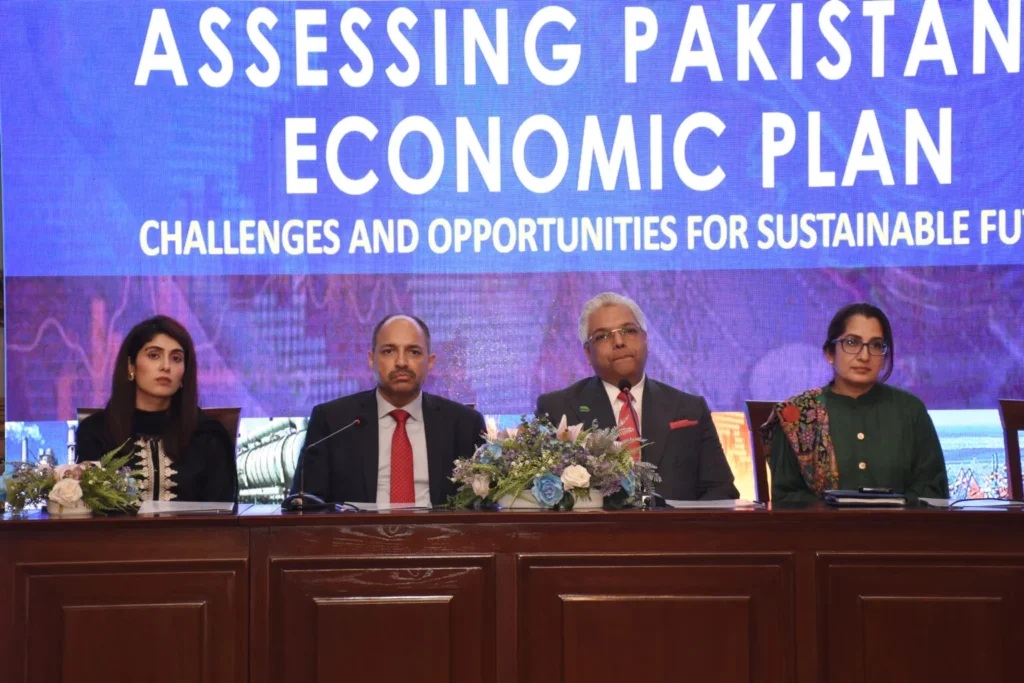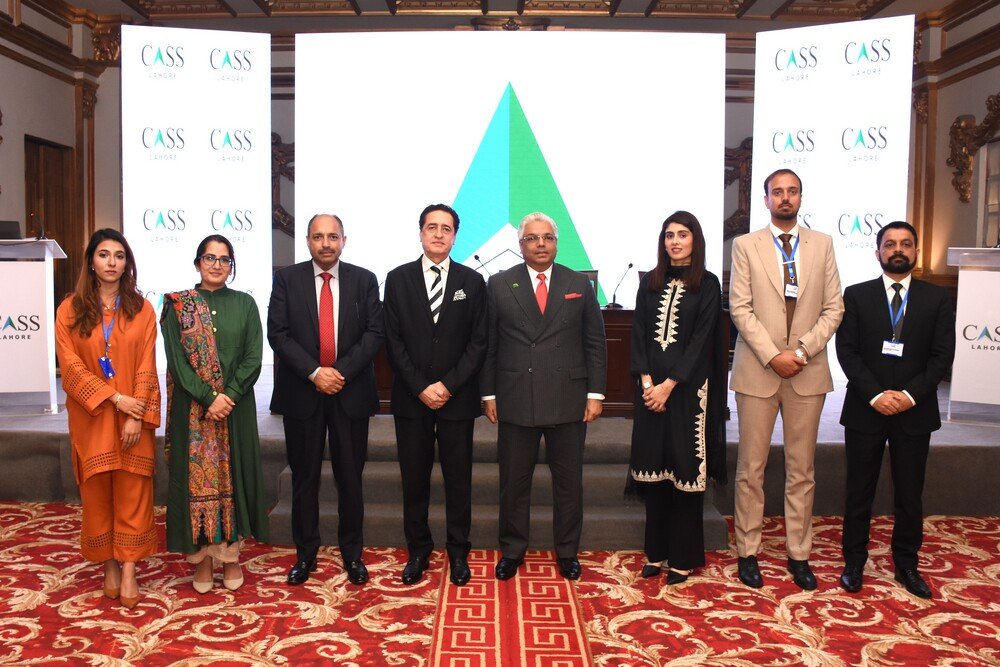
Seminar
Assessing Pakistan’s Economic Plan: Challenges and Opportunities for a Sustainable Future
About The Event
Marred by economic crisis, Pakistan needs to repay approximately $22-30 billion in external debt in the year 2023. The current economic situation, characterised by surging electricity and fuel prices, depreciating exchange rate, soaring debt burden, widening fiscal and current account deficits, and political instability, has created an environment of uncertainty, thus making it difficult for businesses to plan for the future.
To pull back from this precipice permanently, Pakistan needs a paradigm shift in its economic strategy. Numerous frameworks are available to guide the country in overcoming its present economic challenges. Regardless of the specific roadmap or plan chosen, the key to rescuing Pakistan from its current economic crisis lies in addressing the structural issues within its economy. Achieving a comprehensive economic transformation is essential, and this requires a multifaceted approach involving several measures, such as tax reforms, fiscal discipline, policies to ensure debt sustainability, reforming the monetary and foreign exchange system, and ensuring the viability of state-owned enterprises, among others.
The solution must be centred on specific policies and administrative measures to fix the economy in a sustainable and viable way for the future. However, a grounded solution means administering an extremely bitter pill. The abysmal policies of successive governments and their complacency with kicking the can down to the road have brought the state to a dead end. As in the past, peer pressure problems encaptivated political governments from developing a business plan. However, in the present situation, hard choices are now linked with survival.
Considering the vulnerable economic situation, coupled with a scarcity of foreign exchange reserves, Pakistan needs to repay around US$25 billion annually, on average, for the next three years. Under this abysmal situation, the sustainable management of loss-making State-Owned Enterprises (SOEs) without further burdening the already widening fiscal deficit is a significant challenge. Privatisation of such SOEs might be an option, as it serves two purposes: raising foreign exchange and reducing the budgetary burden of supporting poorly performing, loss-making SOEs. However, the privatisation of SOEs comes with severe political repercussions for the government, creating a situation where political representatives must decide whether to wait for Godot or take the silver bullet. Any solution for economic recovery must be based on cold calculations driven by a cost and benefit analysis. The economic recovery plan should focus on the structural issues rather than harbouring the illusion of vast and untapped resources or that Pakistan’s friends would keep it afloat.
Keeping these considerations in view, the seminar titled, “Assessing Pakistan’s Economic Plan: Challenges and Opportunities for a Sustainable Future” was held to delve deeply into the convoluted economic landscape of Pakistan to rethink its economic strategy. The overarching objective was to gain insights through interaction with academicians and industry experts to explore pathways for sustainable and resilient economic recovery.

Key Takeaways
- Rethinking Resource Management
Pakistan’s current economic situation requires progressive – aggressive resource mobilisation and rationalisation of expenditures for economic revival.
- Fiscal Federalism in Pakistan
In Pakistan’s economic landscape, structural reforms remain hamstrung due to the overlaps in the functions between federal and provincial governments even after the 18th Amendment. Moreover, provincial governments remain resistant to devolution of power.
- Declining Defence Spending Ratio
Apart from flawed macroeconomic policies, a 30 percent increase in pensions and salaries led to a decrease in the defence budget by 15 percent. The current defence spending ratio stands at 1:8 against the neighbouring India, which is considerably less than the ratio of 1:3, a level considered adequate for national defence.
- Dependency on international Loans
The excessive dependence on international loans has created a structural imbalance in Pakistan’s economy. Moreover, the rent seeking behaviour has provided space for international actors to influence economic policies in a negative way.
- Efficiency of Bureaucracy
Bureaucracy performs a vital role in enforcing accountability and implementation of good governance. However, because of the economic inaptitude and capacity, it lacks the ability to bring a profound transformation in the economic landscape.
- Strategic Approach to Privatisation
Meticulous and palmary privatisation strategy can unlock the economic potential, reduce the financial burdens, and pave the way for sustainable growth in Pakistan.
Policy Considerations
- Equitable Reforms for Equitable Growth
Pakistan needs to act strategically to achieve sustainable, inclusive, and equitable growth moving forward. For such a comprehensive restructuring of Pakistan’s economic architecture, it is pertinent to undertake impoverished oriented equitable reforms.
- Forging Shared Economic Vision
To address Pakistan’s economic woes, policymakers must manage economic issues with a state-centric approach to undertake broader reforms. A shared vision, long-term strategies, and collaborative efforts are required to address economic fault lines.
- Self Sufficiency in Defence Budget
Pakistan’s reliance on borrowed money to fulfil defence budget indicates fundamental flaws in Pakistan’s economic trajectory. Self-sufficiency in the military’s budget must remain the top priority, considering the geopolitical imperatives.
- Technology as Engine of Growth
To revolutionise the economy, Pakistan must embrace technology in all sectors. Moreover, Pakistan can develop an efficient and integrated strategy through technological integration to ensure good governance.
- Economic Diversification
Pakistan must diversify its economy through the integration of financial technologies. The fintech cosystem could have a multiplier effect on Pakistan’s economy. To take independent trajectory in economic decisions, Pakistan needs to formulate an economic strategy focused on the diversification of the economy.
- Consistency of Policies and Institutional Revamp
To foster Pakistan’s economic resilience, policymakers need to transit away from a narrow narrow-minded approach of reactive policies and solitary remedies. Policy continuation and institutional reforms with state state-centric approach are vital to achieve the desired outcomes. The economic turnaround of Pakistan depends upon its ability to optimize its revenue collection. Fair taxation system, industrial reforms, modernisation of agriculture sectors, investment-led growth, and foreign direct investment can be the key elements of revenue generation strategy.
- Building Fair Tax System
Pakistan must eradicate the concept of ‘non-filer’ from the taxation system. Moreover, imposition of taxes must be based on income instead of taxing a similar percentage on all salaried individuals.
- Managing Unsustainable Debt
Pakistan must diversify its economy through the integration of financial technologies. The fintech ecosystem could have a multiplier effect on Pakistan’s economy.
- Diverse and Inclusive Decision-Making
To reduce international actors’ influence, Pakistan must enhance diversity and inclusivity by bringing academia and industries into the decision-making process.

Post Event Report
A comprehensive report capturing expert analyses, strategic insights, key recommendations, media coverage, and event highlights.
Guest Speakers

Dr Hafiz A Pasha
Economist/ Former Minister/ Dean BNU
Dr Mumtaz Anwar Chaudhry
Dean FBEA, Punjab University


Dr Abiha Zahra
Assistant Professor, Information Technology University
Mr Nadir Salar Qureshi
Chief Investment Officer, Engro Corporation


Maheen Rehman
CEO, InfraZamin

Event Chair
Air Marshal Asim Suleiman (Retd)
President, CASS Lahore

Event Coordinator
Bilal Ghazanfar
Associate Senior Researcher, CASS Lahore

Master of The Ceremony
Rameen Shahid
Researcher, CASS Lahore








CASS LAhore

The Centre for Aerospace & Security Studies (CASS) was established in July 2021 to inform policymakers and the public about issues related to aerospace and security from an independent, non-partisan and future-centric analytical lens.
CASS Newsletter

@2025 – All Right Reserved with CASS Lahore.
- Home
- About Us
- Research Domains
- Publications
- Events
- Gallery
- Contact Us
@2021 - All Right Reserved. Designed and Developed by PenciDesign



